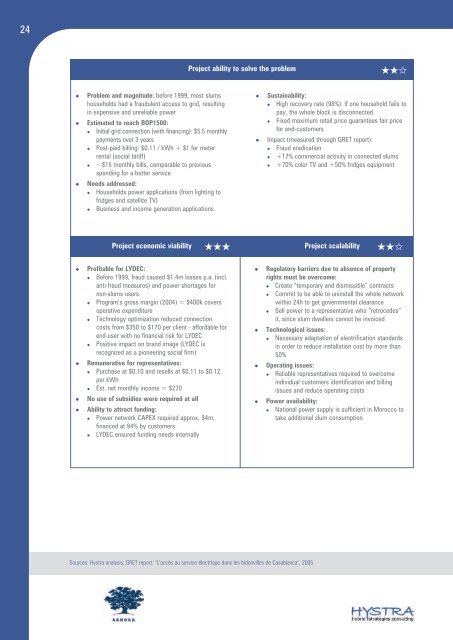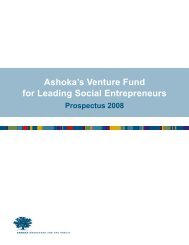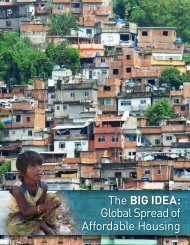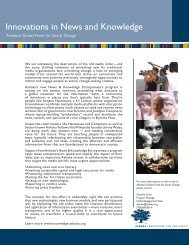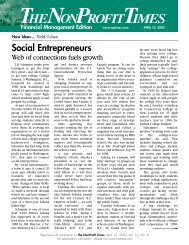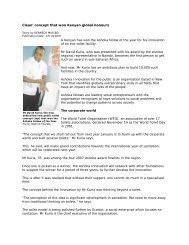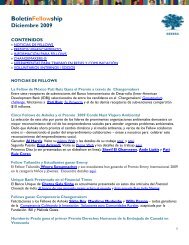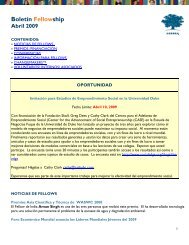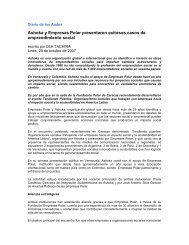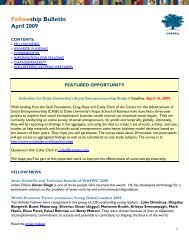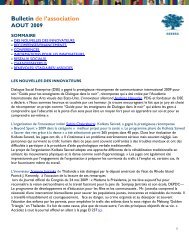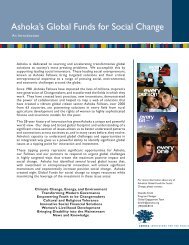Access to Energy for the Base of the - Ashoka
Access to Energy for the Base of the - Ashoka
Access to Energy for the Base of the - Ashoka
Create successful ePaper yourself
Turn your PDF publications into a flip-book with our unique Google optimized e-Paper software.
24<br />
� Problem and magnitude: be<strong>for</strong>e 1999, most slums<br />
households had a fraudulent access <strong>to</strong> grid, resulting<br />
in expensive and unreliable power<br />
� Estimated <strong>to</strong> reach BOP1500:<br />
� Initial grid connection (with financing): $5.5 monthly<br />
payments over 3 years<br />
� Post-paid billing: $0.11 / kWh + $1 <strong>for</strong> meter<br />
rental (social tariff)<br />
� ~$15 monthly bills, comparable <strong>to</strong> previous<br />
spending <strong>for</strong> a better service<br />
� Needs addressed:<br />
� Households power applications (from lighting <strong>to</strong><br />
fridges and satellite TV)<br />
� Business and income generation applications<br />
� Pr<strong>of</strong>itable <strong>for</strong> LYDEC:<br />
Project ability <strong>to</strong> solve <strong>the</strong> problem<br />
� Sustainability:<br />
� High recovery rate (98%): if one household fails <strong>to</strong><br />
pay, <strong>the</strong> whole block is disconnected<br />
� Fixed maximum retail price guarantees fair price<br />
<strong>for</strong> end-cus<strong>to</strong>mers<br />
� Impact (measured through GRET report):<br />
� Fraud eradication<br />
� +17% commercial activity in connected slums<br />
� +70% color TV and +50% fridges equipment<br />
Project economic viability ★★★<br />
Project scalability<br />
� Be<strong>for</strong>e 1999, fraud caused $1.4m losses p.a. (incl.<br />
anti-fraud measures) and power shortages <strong>for</strong><br />
non-slums users<br />
� Program’s gross margin (2004) = $400k covers<br />
operative expenditure<br />
� Technology optimization reduced connection<br />
costs from $350 <strong>to</strong> $170 per client - af<strong>for</strong>dable <strong>for</strong><br />
end-user with no financial risk <strong>for</strong> LYDEC<br />
� Positive impact on brand image (LYDEC is<br />
recognized as a pioneering social firm)<br />
� Remunerative <strong>for</strong> representatives:<br />
� Purchase at $0.10 and resells at $0.11 <strong>to</strong> $0.12<br />
per kWh<br />
� Est. net monthly income = $270<br />
� No use <strong>of</strong> subsidies were required at all<br />
� Ability <strong>to</strong> attract funding:<br />
� Power network CAPEX required approx. $4m,<br />
financed at 94% by cus<strong>to</strong>mers<br />
� LYDEC ensured funding needs internally<br />
Sources: Hystra analysis; GRET report: "L’accès au service électrique dans les bidonvilles de Casablanca", 2005<br />
★★✩<br />
★★✩<br />
� Regula<strong>to</strong>ry barriers due <strong>to</strong> absence <strong>of</strong> property<br />
rights must be overcome:<br />
� Create “temporary and dismissible” contracts<br />
� Commit <strong>to</strong> be able <strong>to</strong> uninstall <strong>the</strong> whole network<br />
within 24h <strong>to</strong> get governmental clearance<br />
� Sell power <strong>to</strong> a representative who “retrocedes”<br />
it, since slum dwellers cannot be invoiced<br />
� Technological issues:<br />
� Necessary adaptation <strong>of</strong> electrification standards<br />
in order <strong>to</strong> reduce installation cost by more than<br />
50%<br />
� Operating issues:<br />
� Reliable representatives required <strong>to</strong> overcome<br />
individual cus<strong>to</strong>mers identification and billing<br />
issues and reduce operating costs<br />
� Power availability:<br />
� National power supply is sufficient in Morocco <strong>to</strong><br />
take additional slum consumption


